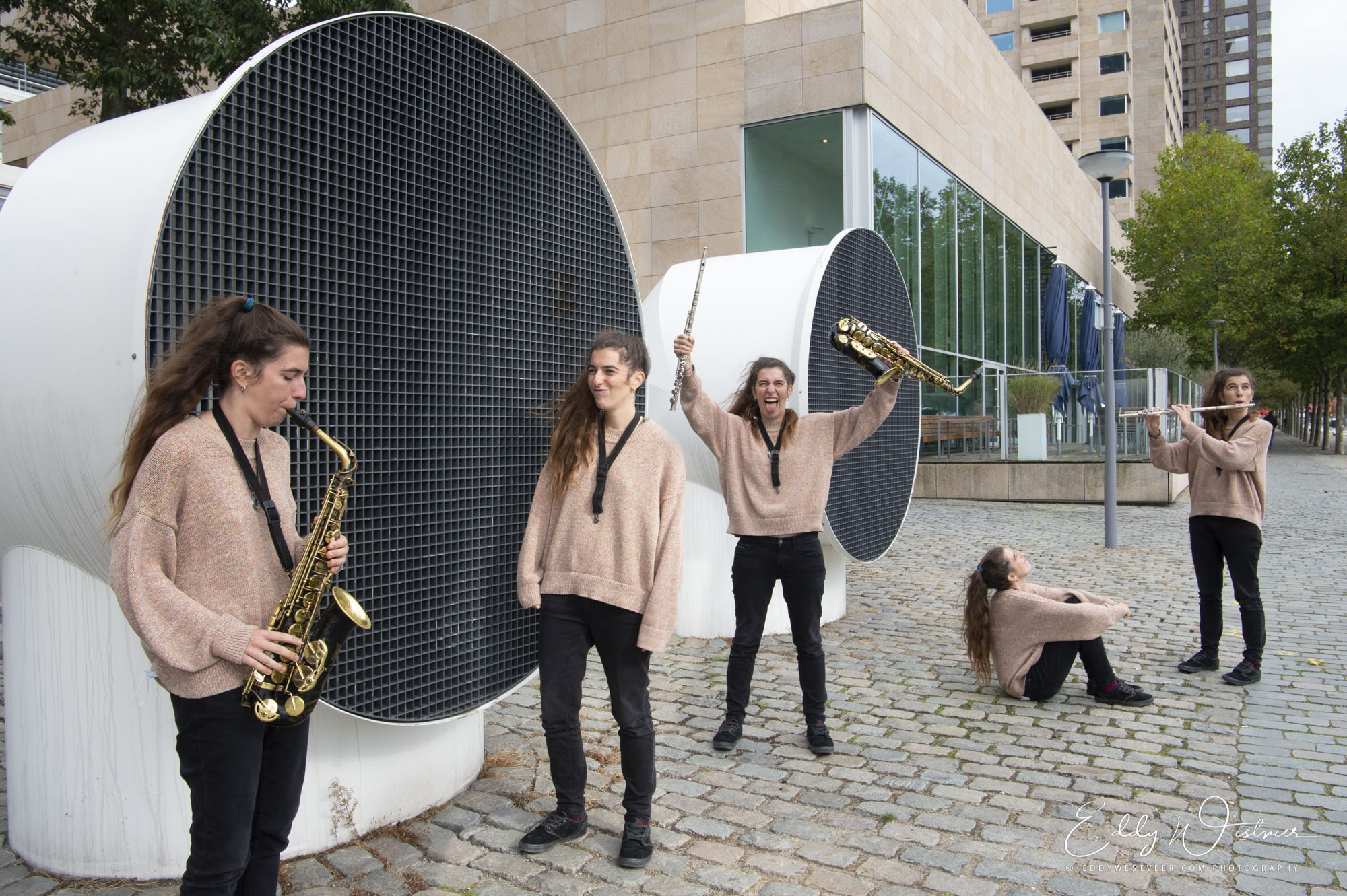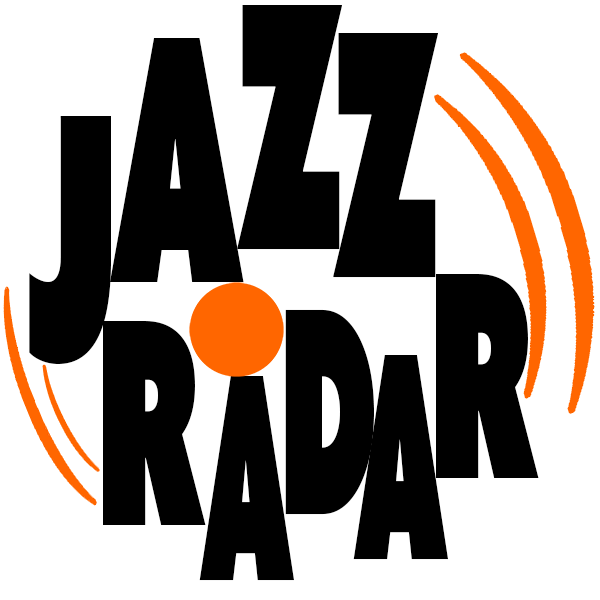Alba Gil Aceytuno – the best of two worlds for The Pack Project

EN / NL
Every year, Jazz International Rotterdam presents The Pack Project, led by an emerging young artist. This year (2020) the leader of the pack is the rebellious saxophone player Alba Gil Aceytuno. In recent years she has taken stages by storm with her trio Amaguk, sharing with audiences her explosive cocktail of jazz, improvisation and electro. For the Pack Project, Gil Aceytuno and the Festival Jazz International Rotterdam have put together a whole new band (‘The Pack’), which will perform in both Nijmegen and Rotterdam.
In this one-off formation Gil Aceytuno will present a new set brimming with influences of all kinds — from punk to classical, and with a generous helping of African and Canary folklore thrown in as well. The young musician has spent years practicing circular breathing techniques, a skill that we will certainly hear in these special compositions. As a result, her saxophone sometimes plays more of a supporting role, a stark contrast with the bombastic sounds we normally hear from her, but no doubt giving an interesting twist to the new music from this up-and-coming talent.
JAZZRADAR met Alba Gil Aceytuno in Rotterdam to talk about this project and more.
After studying (classical) saxophone in Gran Canaria you decided to move to Holland to study jazz bachelor. What made you decide to go for jazz and for Holland and why your next move from the Hague to Rotterdam?
In Gran Canaria there wasn’t any option to study jazz, and I also wanted to go out of the island (still my favourite place!) to open my mind and know about other places, cultures and types of music. I had to choose between Barcelona and Holland, but I went to The Hague in order to learn English as well. I don’t regret it at all, it has been one of the greatest experiences in my life, even though my time in the school was not as good as I expected. This year I moved to Rotterdam because I love the musical scene of the city and its atmosphere in general.
The Hague was not as you aspected to be. What do you mean?
I was never a bebop/traditional player, but I arrived in The Hague willing to learn more about it, what I didn’t expect was that it was the only thing the school was offering. Of course some teachers have really open-minded ideas about music and I learned a lot from them, but the atmosphere I perceived in the school was quite conservative, what I believe happens a lot in conservatories (living up to its name haha). Nevertheless, I’m a better musician since I entered the school and the people and artists I have met because of it make the whole process much more than worth it.
You were chosen as leader of the Pack Project 2020 to perform at FJIR and FJIN (when Corona allows). How does that work and when did you start with rehearsing/composing etc.?
I have no words to thank and describe how I feel about having been chosen as the leader of the Pack Project of this year. I compose music since I’m 16 years old, but this project has been a huge impulse to develop my writing and define my style.
I started preparing the repertoire at the beginning of this strange 2020, but I did most of the work during summer. During the lockdown it wasn’t always easy to find the inspiration. I was attending to arranging lessons as well, what has a really big role in the music I have written, thinking about the seven instruments I’m counting with, and the people who play them! We started rehearsing in September and the energy of everybody is coming along amazingly good.
How did your Pack Project originate? What was the start? Was it some idea for music, were it the instruments or did you have some musicians in mind?
Since the very first moment Sophie and Marzio told me about the Pack Project I started thinking about so many possibilities to give shape to the band, but I knew that the circular breathing would have an important role in the repertoire. I learned how to do this technique in a natural pool in my home village in Gran Canaria in a quite spiritual way haha and since then it has been an important tool in my playing and writing. There will be couple of songs in Rotterdam And Nijmegen based on that.
The formation of the band came mostly because of the people I wanted to play with, but also from my desire of mixing the sound of the modern jazz with the more dirty and powerful energy of the punk/rock. That’s also why I decided to have two drummers in the band. There’s some people in the band that I have played a lot with, like Alba (trumpet) or Tristan (drums), and some others that I just played or listened to a couple of times, but really made me love their playing. All of them are quite different from each other, from different parts of the world and several musical backgrounds, so I got a really rich band in energy and freshness.
The Pack Project is a coached project of Jazz International Rotterdam. What did you learn and who/what was of great help?
The whole team of Jazz International Rotterdam has been an inspiration and source of learning, it’s been a dream to work with them. This is the first time I’m the leader of a project, and the amount of things I have learned from it is countless. Of course about music: composing, arranging, playing etc, but also about management, planning and all these aspects behind the stage. Marzio Scholten and Sophie Blussé in particular have helped me a lot during the process.
What makes the difference for you between a trio and the Pack septet?
First of all the formation of the band, the fact that Amaguk does not have a bass gives it a really characteristic sound. Also the three horns instead of one changes the way the melodies are presented. The different musicians also have a lot to do! In addition, in Amaguk we work in the songs together, doing a collective work of composition; for the pack project I have done a much more solitaire composing process, which changes a lot of things in the final result.
And are there some similarities with Amaguk?
There are! Both projects have the punk energy as ‘power supply’, which mixed with improvisation and more jazzy harmonies creates a characteristic sound. Also my style remains quite similar while playing with Amaguk or the Pack, so I think people will find some things in common.
What is your personal ambition after study?
Nowadays it is quite difficult to plan anything, but my idea is to stay in Rotterdam developing the projects I’m involved with (Amaguk, Don’t Cut the Tree, etc.) and play with different people in the city. I finished my studies this year but I want to keep learning about so many styles and techniques. Also I want to stay active in the scene of Gran Canaria and mix my two worlds.
EN / NL
Text & photography: Eddy Westveer
THE PACK PROJECT
LINE-UP
Alba Gil Aceytuno – alto saxophone, flute
Alba Careta – trumpet
Ebba Asman – trombone
Yuri Rhodenborgh – guitar
Alessandro Fongaro – bass
Denis Baeten – drums
Tristan Guillaume – drums
CONCERT
Rotterdam RauwFest OCTOBER 27, 2021
Nijmegen FJIN OCTOBER 29, 2021


